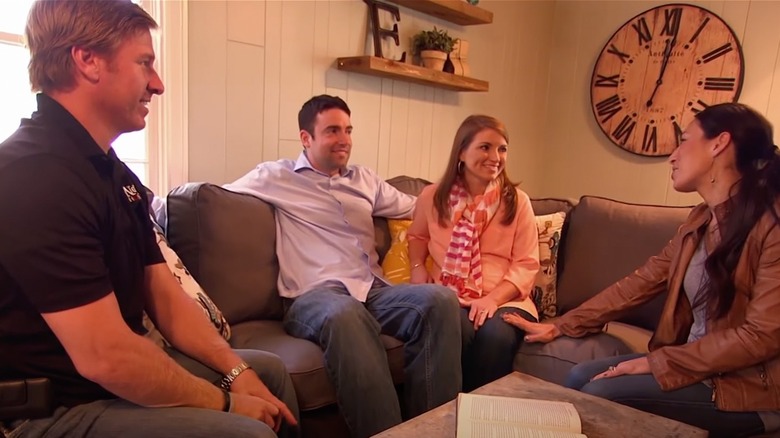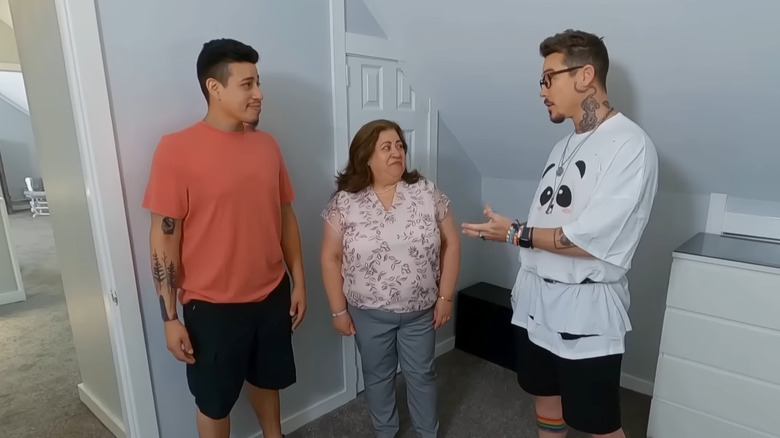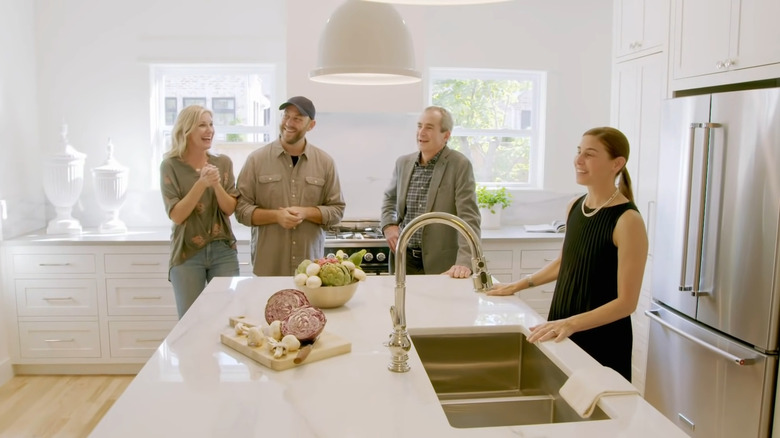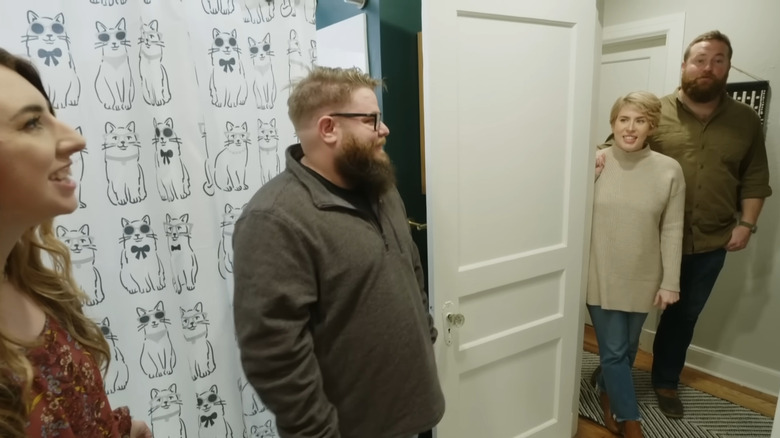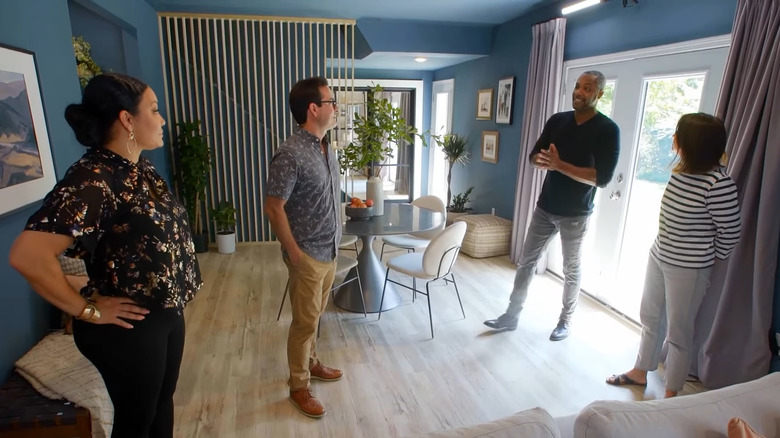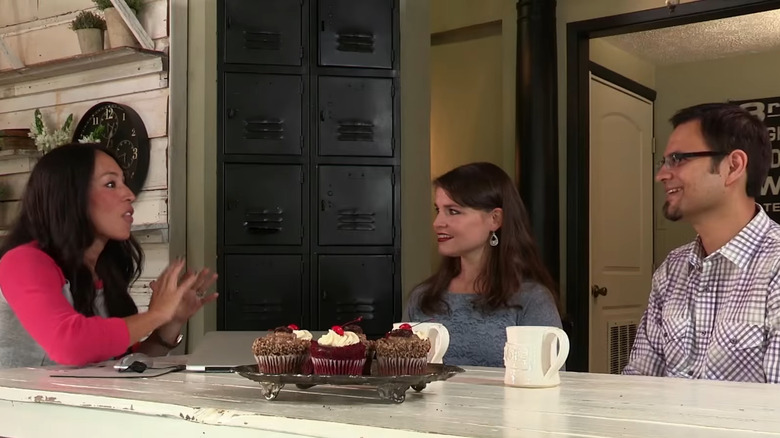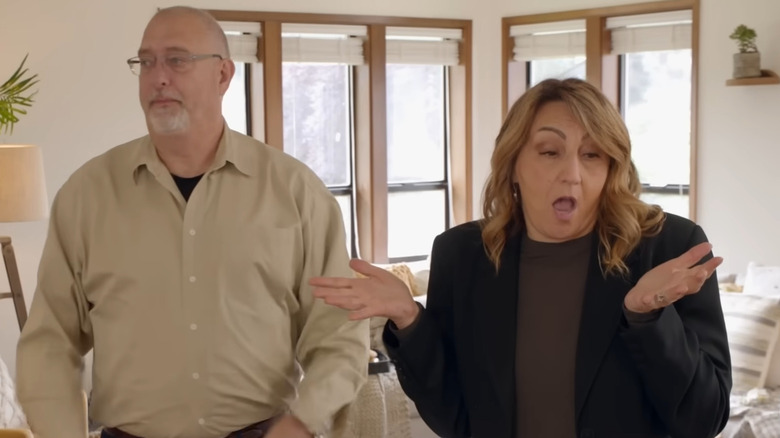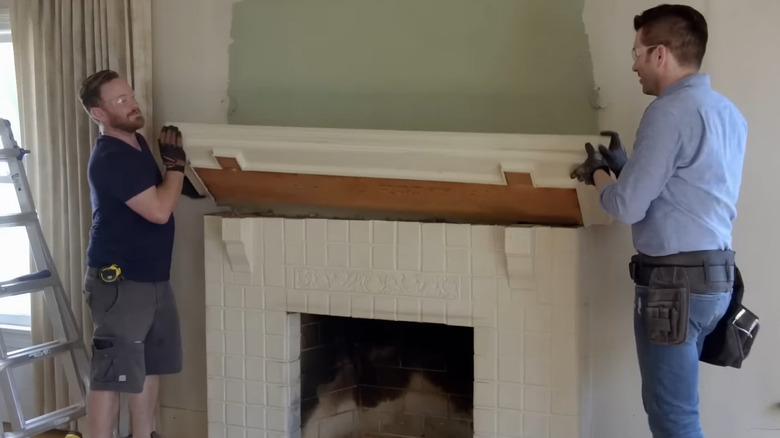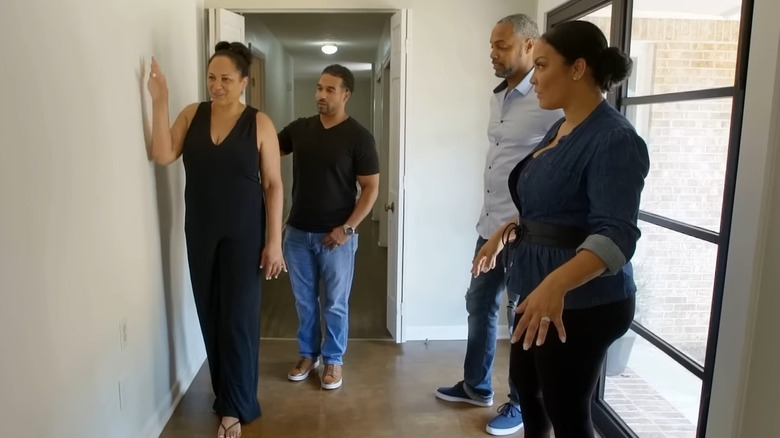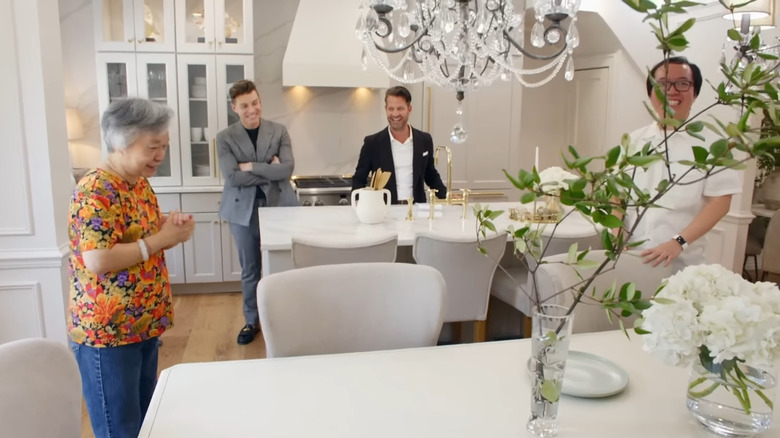Surprising Things HGTV Contestants Can't Do
HGTV makes dreams come true, often delivering more than contestants thought of — let alone requested. It's an exciting opportunity to experience a moment of fame, win a dream home, or have one of the nation's top interior designers remodel your house. Each contestant gets to be a star of an episode and meet the hosts of their favorite shows in the dazzling lights and captivating gaze of the camera.
It's easy to imagine that being on an HGTV show is full of giddiness and excitement where HGTV gives contestants everything they want, but there's more to the show that the viewers at home don't see. What can't participants do once they get on the show? What aren't they allowed to keep? And what kind of restrictions does the network put on each contestant? In the quest to turn dreams into reality, what are the limits? Here are surprising things HGTV contestants can't do.
Always afford their homes
Much like the lottery, taxes are a well-known complication to winning a multimillion-dollar home. The sad truth is that while "Dream Home" customizes houses for the contestants, there's no way to customize property taxes to eliminate their financial burdens. Fortunately, the show doesn't require winners to take on the expense, instead providing a cash offer to those who can't afford their new property. While the money isn't quite as much as the dream homes' value, winners can purchase an inexpensive place and cover other financial needs.
Many HGTV contestants can't actually afford their dream homes. Country Living found only six of the 21 "Dream Home'" winners stayed living in their homes for over a year. Some decided to keep the house, hoping to stay there but found the cost too much, while others stayed intending to sell for a more significant cash sum.
"Dream Home" is not the only HGTV show where contestants use their property to cover costs. "Fixer Upper" guests started renting their properties on Airbnb, VRBO, and other vacation rental websites, to recuperate expenses. They used the unique design and the show's fame to attract renters — an alluring opportunity for the homeowners but an inevitable frustration to long-time locals. While contestants may not be able to afford everything they get from the show, their winnings more than pay for themselves ultimately, allowing everyone to come out ahead.
Publicly complain about renovations
Of course, it's easy to make it appear like everyone gets everything they want if contestants aren't allowed to talk about their experiences publicly. Fans of the programs likely question what participants could complain about after drooling over the incredible designs featured at the end of each episode. But a few disappointed participants shed light on the issues they experienced after the cameras shut off and their favorite renovation teams left.
The shows these contestants loyally watched for years left them so broken-hearted they ended up suing. The unlucky few received what they described as rushed and shoddy work, sometimes not up to code or even safe. But how come we've barely heard about these moments? In the age of social media and the power of the review, why aren't these stories better known?
A New York Times investigation uncovered contracts contestants signed barring them from publicly discussing the show in any facet. Technically it goes beyond the general public, too, restricting participants from sharing show details with even their closest friends and family members. While there aren't too many lawsuits in the network's history, there is some consistency in the complaints, such as the show coaching guests to fake their reactions, often doing several takes. Not surprising when you think about how hard it would be to feign happiness when a renovation job goes awry.
Do just one take
More often than not, contestants leave the show with a reality built from dreams. But just because they love everything they see doesn't mean they can get away with one take. Contestants may have to repeat a scene more than once to capture their reaction the right way. A couple from "Curb Appeal: The Block" described getting instructed to go back in their house and reshoot their exit so the crew could get a b-roll of the couple talking to neighbors (via AV Club).
It's not always about the homeowners' interactions; sometimes, it's purely logistical. As Drew Scott of "Property Brothers" explained (via Reader's Digest) that sound is crucial in shooting a television series. As you can imagine, shooting outside instead of a controlled studio involves an entire crew of undesired cast members, making their voices or horns heard. From birds to trains, the series often redoes a scene to ensure viewers hear what the hosts are saying. With all these complications, it's no wonder participants must commit at least seven weekdays to film. Whether it's the wrong reaction or logistical difficulties, these aren't one-shot scenes.
Appear on the show alone
HGTV doesn't require participants to be married or in a relationship. The applications encourage single participants to apply. But what many don't realize is guests can't go on the show alone. While it's not in the application's rules for "Property Brothers" contestants to follow, or any other application for that matter, the brothers explain in their book "It Takes Two: Our Story" that while they're happy for participants to be single or married, they need two contestants for the sake of the program.
The second can be a friend or family member; the network isn't picky about the relationship. The extra guest is there for the back and forth between participants. They don't make the decisions but help the homeowner consider their options and make choices. It's about creating natural dialogue viewers can follow to understand the contestant's thinking — so they're not left guessing what that weird face someone made meant.
Having a second person there can also help reduce nerves over chatting about design with the designers. Contestants are welcome to disagree with hosts, but telling an idol no is harder than telling a friend. Luckily for guests, the network insists on that friend, and there's usually no shortage of people excited for their 15 minutes of fame. Participants can likely find a few community members ready to jump in and fill the position.
Skip the bill
One of the biggest things viewers wonder about as the incredible renovations take form is who's footing the bill. Years of big prizes on game shows can create the expectation that networks are willing to spend large sums of money for regular folks to entertain their viewers. But the truth may surprise you.
In most cases, the person paying for the renovation is the homeowner, not HGTV. The most obvious exceptions are HGTV's "Dream Home” and "Dream House Makeover," where the show makes dreams come true for contestants with new or remodeled homes. While it's a little disappointing to hear they don't cover the cost, when we consider the money spent per episode on one of these series, it's easy to understand how a roster of shows with that level of expenses might not be attractive to a network.
The other exception to the rule is "Rock the Block." As you likely assumed, the money given to your favorite renovation show hosts to compete against each other is not out of contestants' pockets. But the budget is firm, so even if they wanted to chip their own money in for a room, they couldn't.
Keep the furniture
Anyone who's watched "Fixer Upper" has eyed the dynamic furnishings in the homes with envy. When the show started featuring Joanna Gaines' warehouse which likely once felt like a hoarder's cache, it became a practical catalog of aspirational decor. Her incredible finds and custom builds turned Chip Gaines' remodels into captivating creations. They made you imagine yourself sitting in the room, cultivating a life around the furnishings.
Sadly, contestants didn't get the furniture. While they could add the decor to their bill, the listed renovation costs excluded furnishings. If guests had the extra cash, they could pay to keep everything. Luckily, that's not the case for every HGTV show.
On "Home Town," Erin and Ben Napier keep the homeowners' budgets in mind as they remodel homes. While not all items get included in the total price, they ensure that some custom pieces don't exceed contestants' spending limits, as Erin explained to fans (via Instagram). They also use as much of the contestants' old furniture as possible, only bringing unbought items in to fill gaps in the decor. They itemize the selection for the homeowners, with information on the local shop and the sizable discount the network secures. HGTV's favorite brothers take it a step further though, homeowners on "Property Brothers" keep all the furniture as Drew Scott told fans (via Twitter).
Expect renovations to stay within budget
Okay, so maybe the reason HGTV contestants can't stay on budget isn't the network but the nature of home remodeling itself. It's such a fundamental reality the show doesn't bother hiding it, instead embracing the struggle with humor, joking about the guarantee of extra costs.
So, while it's not surprising guests on renovation shows can't stay on budget, what may shock you is just how much money they're required to have to land a spot on an episode in the first place. When "Fixer Upper" started, the requirement was only $30,000. Not only is the show long gone, but so are the days of the low renovation costs.
Today, "Love It or List It" requires applicants to have a budget of $75,000 to even get on the show. And if you thought that number was considerable, prepare to be shocked at the "Property Brothers" requirements. Their already high baseline of $90,000 went up after 2020 when construction costs skyrocketed. According to the application, the average rate for renovations went up from $200,000 to $250,000. And if those numbers weren't enough to surprise you, the show requires contestants to have more than their budgets to cover those inevitable overages. So, the cost to hire the Property Brothers can easily exceed $300,000.
Hide their personality
The first word the show uses to describe potential participants is energetic because they need you to bring personality to keep the show entertaining. But they don't want you to bring someone else's personality. They want engaging and dynamic participants, people with charisma who aren't afraid to express themselves. It helps if you have a gripping backstory, something to ground the episode in, but what matters most is for contestants to act like themselves.
If you're not an actor, improv probably isn't your strong suit, so creating an identity for the show isn't going to read well. On the other hand, if a contestant naturally has great banter with the second contestant, it creates engaging dialogue and compelling content.
Letting their personality do the talking doesn't start when the cameras start rolling, either. To get on the show, applicants need their individuality to shine through the standard questions on the form. This is the time for dad jokes, cheesy one-liners, and other quippy takes to take center stage. And if you're considering applying, remember, if you're not picked, you'll never talk to the people who read your application anyways — so don't be shy; let your personality shine.
Be indecisive, especially when recording
If you have trouble deciding what you want to eat for dinner or which pair of blue shoes looks better with your outfit, you may not have what it takes to appear on an HGTV renovation show. The network makes it a point to weed out anyone indecisive in the application process, going as far as directly asking applicants on the form.
Renovation shows have to run fast-paced schedules to keep up with production requirements. Set times don't allow for precious moments to be lost to contestants agonizing over the shade of green for their living room. So, they look for and require contestants to be highly decisive in all judgments. It goes beyond the production value, too. Renovations typically take much longer than what contestants on these shows experience. For things to happen quickly, construction workers can't have their schedules held up by a homeowner mulling things over. It's the price you pay for 15 minutes of fame, the chance to work with renowned interior designers, and getting significant renovations done in an otherwise impossibly fast timeline.
Avoid getting their hands dirty
Not every show enlists the help of contestants, but for those appearing on "Property Brothers," getting their hands dirty is a part of the deal. Jonathan Scott explains (via PopSugar) that the brothers work hard to minimize costs for participants. They want their guests to get the most out of the experience. When things start to go over budget, the brothers go as far as putting in free hours of their labor over local contractors and enlisting the property owners themselves.
Of course, any DIY home improver's dream is to work beside the Scott brothers and learn from their expertise. Since participants tend to be fans of the show, when the brothers ask the contestants to lend a hand to lower costs, they're usually more than happy for the opportunity. Knowing they helped build a part of their home can become a treasure for their memories. It's certainly not the worst deal in the world — save money and learn from Drew and Jonathan Scott while transforming your house into the property of your dreams.
Pick their own outfits for the show
Contestants' wardrobes on HGTV shows are always simple and classy, never overstated. Looking at participants, it's easy to assume they're wearing their everyday clothes, and in some ways, they do. But there's nothing every day about the outfits that make it on screen. The network takes participants' fashion senses very seriously.
Yes, HGTV shows control what contestants wear on set. But they aren't bringing each guest a wardrobe of outfits to try. They're not even sending one. Instead, the network asks contestants to plan a few different looks for them to review. The show's stylist then decides which look works best for the episode.
It may sound exciting for a guest to get a professional stylist to pick out their outfit, but it can also be daunting for some. One woman brought several of her favorite looks just for them all to end up rejected, as she confessed in her interview with The Dallas Morning News. Leslie Remy, a realtor on "House Hunters," described the experience of having all her favorite outfits cast off by a representative of the show. While it was likely a heart-wrenching experience, it's important to remember the show isn't judging you for your fashion sense unless, of course, you're on one of the shows where that's precisely what they're doing. But in most cases, the goal is cohesion with the show's aesthetic, not to critique your style.
Pay full price
If you've ever had a room in your home remodeled, you've likely wondered how contestants on HGTV's renovation shows get so much out of their budgets. While they typically pay for the renovations themselves, the cost is significantly less than it would be if they weren't on the show. It's common for HGTV to partner with local contractors, getting deals on labor in exchange for promoting their businesses or products. "Property Brothers," for instance, are known for not doing all of the work themselves, taking advantage of local contractors to help more contestants until it becomes cost prohibitive.
Nearby vendors offer their services at much lower rates for the incredible marketing opportunity the show provides. It's a small price for national coverage, but not all contractors are willing to agree to this deal. Some contractors insist that homeowners should cover the traditional costs of labor.
However, if contractors agree to this deal, homeowners benefit from a major discount and get to work with the nation's best interior designers and connect with local contractors for future work. As if the opportunity and savings weren't enough, the network often covers extra expenses when rapid schedule requirements increase costs too much. Considering all the benefits, the high budget requirements to get on one of these shows aren't so bad. It would cost much more to get the same work done if HGTV weren't airing the process for all its viewers to watch at home.
See their home before the big reveal
With all of the retakes and coaching from the producers, you might wonder if the big reveals are real. It's easy to think there's no way contestants go through the entire remodel without sneaking a peak at their home. But there's more than one reason participants can't stay at their property while it's worked on. The most obvious is to give the construction workers free reign of the house to get the remodel done as quickly as possible. But the other reason is to keep the work a surprise.
Contestants can't see their homes before the big reveal, according to Rhonda Phillips (via Realtor), who was a contestant on Season 4 of "Home Town." The goal is to capture the shock and excitement on a contestant's face as they see their new house or newly remodeled property for the first time. "Fixer Upper" even went as far as creating giant billboards with images of the homes before the remodel to cover the property, blocking contestants from sneaking a peak as they pulled up. While waiting may feel impossible, the reward is the special moment recorded on film for guests to watch again and again.
Outlive the fame
HGTV is no small network, and while participants typically only show up for parts of a 30-minute to an hour-long episode, fans remember them. Contestants may not experience instant fame, but their face becomes known to many. For those on home renovation shows, their house's fame far outshines their own, turning the properties into incredible investment opportunities. Many guests on "Fixer Upper" saw the potential value their home's fame provided and rented their places out on vacation rental websites.
When past guests talk about what it's really like to be on an HGTV show, they either regale in the notoriety or find it distressing. Not everyone is built for the recognition their 15 minutes of fame offers. But it's more than people remembering them — past "Fixer Upper" participants are often met with groups touring their neighborhoods, some even seeking to look inside the contestants' properties. And while it's undoubtedly a lovely compliment every time someone gushes over their house, there's a reason we don't see many door-to-door salespeople these days — most people don't like being disturbed in their homes.
For some contestants, the fame went beyond recognition or tour requests; it launched a whole new career. David Bromstad is probably the best example, going from contestant to one of the network's favorite hosts. The HGTV "Design Star" winner launched his glimpse of fame into leading roles in three of the network's renovation shows.
